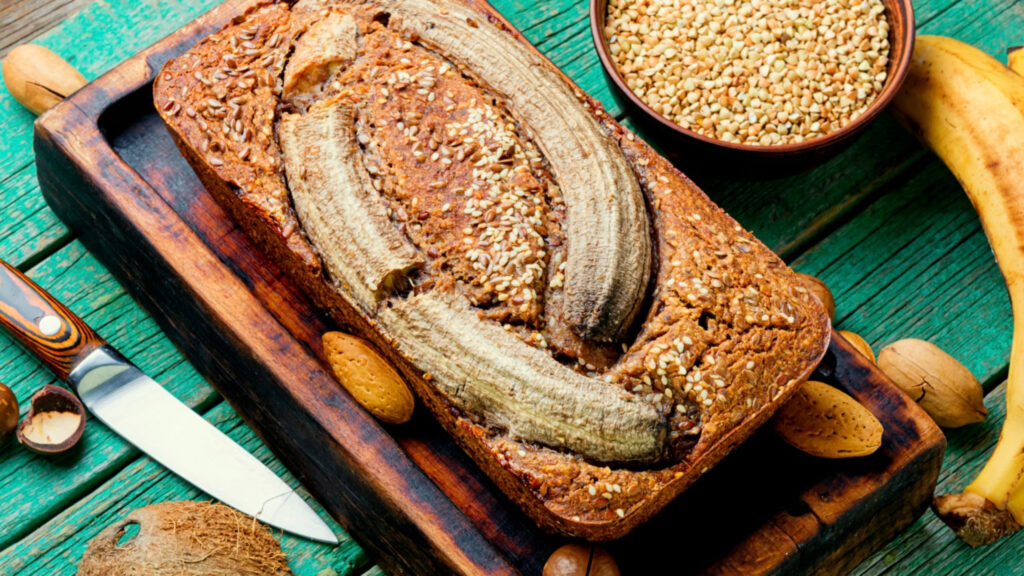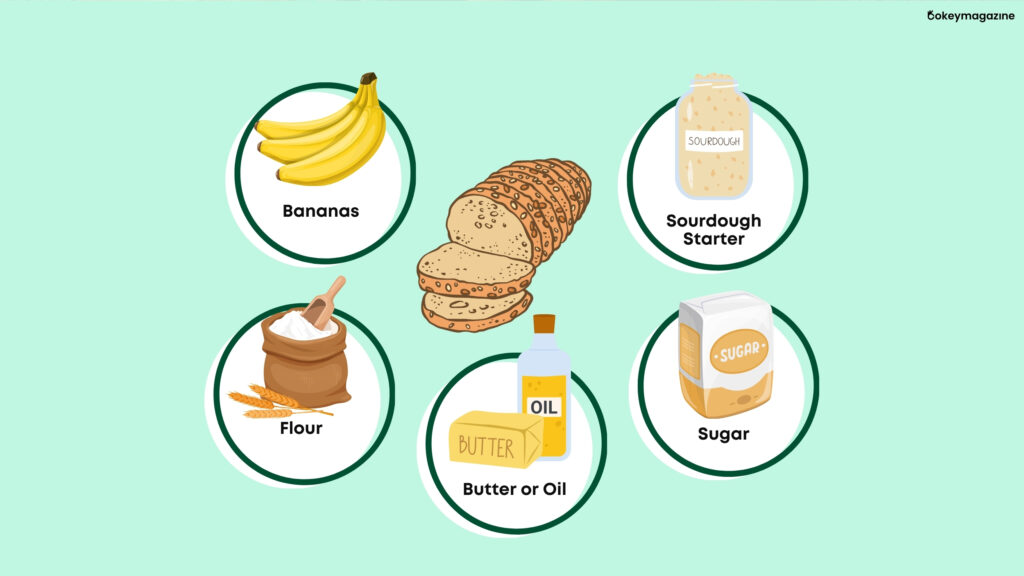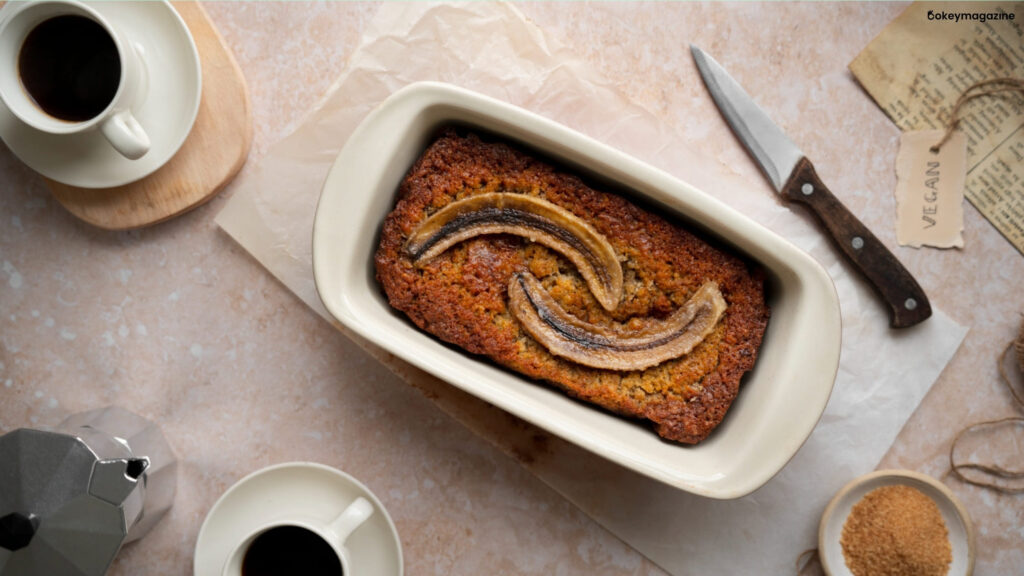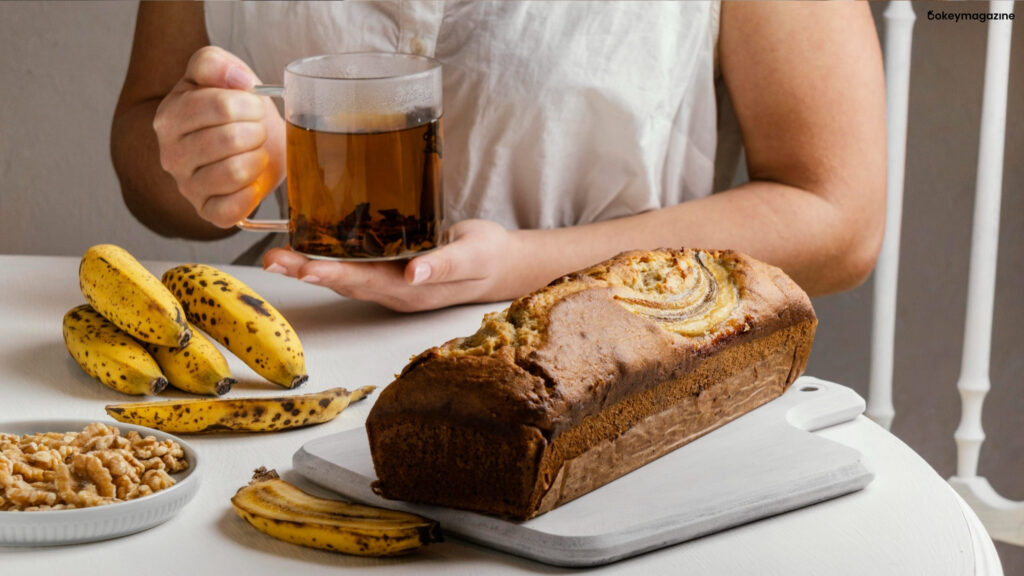
Is It OK to Eat Sourdough Banana Bread Everyday
Sourdough banana bread: Banana bread is just one more comfort food that has been part and parcel of the traditions of houses for decades. It’s sweet, moist in texture, and full of flavor with ripe bananas-that’s why it gets love, be it breakfast, snacks, or dessert.
However, a variation had recently gained popularity: sourdough banana bread. This version now has the sourness, slight tartness from the sourdough flavor, and sweetness of ripe bananas, making for unique and especially delicious bread.
Now that sourdough banana bread is sweeping the nation and finding its place in several households, people ask themselves if it is safe to consume it daily. After all, it is sugar, flour, and fat mixed, which can fill a bread with calories.
This article thus discusses the benefits and pitfalls of having sourdough banana bread every day, the nutritional value of its ingredients, and how it fits into a healthy diet.
What is Sourdough Banana Bread?

Before discussing its health benefits, it would be interesting to know why sourdough banana bread differs from ordinary banana bread. Simply put sourdough banana bread is nothing but the amendment of the banana bread recipe. Instead of baking powder or baking soda, the sourdough starter has been used for the leavening.
A sourdough starter is a mixture of flour and water fermented with wild yeast and lactic acid bacteria. It naturally processes fermentation into a taste that is slightly tangy and denser in texture, more complex than typical quick bread.
The sourdough starter will add a flavor and subtle sourness to the banana bread to mellow the sweetness of the bananas.
Nutritional Content of Sourdough Banana Bread

Only the analysis of nutritional content would reveal whether it is safe to consume sourdough banana bread as a food item every day.
While any given recipe and serving size would be reflective of a certain amount of nutrition, most recipes for sourdough banana bread call for the following primary ingredients:
- Bananas: Bananas have potassium, vitamin C, and fiber. In addition, they contribute some natural sugars to the bread, making it sweet without adding refined sugar.
- Sourdough Starter: The sourdough starter gives the bread a sour taste. Beneficial bacteria, or probiotics, in the sourdough starter may help develop digestive health. The fermenting process breaks down a significant number of carbohydrates in the bread making them easier to digest.
- Flour: All-purpose flour is used for traditional sourdough and banana bread, but some recipes use whole wheat or gluten-free flour. Flour is a carb source that can generate energy but adds to the calorie count.
- Butter or Oil: Almost every banana bread recipe calls for butter, oil, or sometimes both. These fats add moisture to the bread and flavor it, too, but add calories. Butter and oils are fat, a needed constituent of the body, but must be taken in moderation.
- Sugar: So many sourdough banana bread recipes add refined sugar on top of the natural sugars coming from the bananas. More calorie intake and potential blood sugar impact if consumed in excess.
The Pros of Sourdough Banana Bread
- Fiber: Bananas and whole grain flour (if used) are the fiber that ensures digestive health. Fiber slows down digestion; it can help partially as a satiety aid.
- Potassium: Bananas are very high in potassium, an electrolyte needed for healthy blood pressure, muscle function, and nerve signaling.
- Probiotics: The fermentation process allows good bacteria or probiotics from the sourdough starter to enter your banana bread. These probiotics balance the gut flora in healthy conditions, help digest, and sustain normal immune functions.
- Complex Flavors: The sourdough banana bread is soury or could be rather sour because it gives the taste a more complex flavor than the regular banana bread; hence, it’s a fun snack with a twist.
The Cons of Sourdough Banana Bread
- Sugar: Though bananas are coated with natural sugars, some sourdough banana bread recipes contain added sugars that enhance sugar content. Excess sugar has been linked to weight gain, heart disease, and uncontrolled blood sugar.
- Refined Flour: It reduces the nutrient contents of whole grains as follows: fiber, vitamins, and minerals. Additionally, Refined flour is easily digested with high blood sugar peaks.
- Fat Content: The fats inside the butter or oil increase calories taken through bread. Although fats are necessary, if the body has more fat, it will have someone make more fat and increase the likelihood of cardiovascular diseases.
Caloric Density Sourdough or not, banana bread is very caloric, especially in large slices or if the banana bread is consumed several times a day. One slice of sourdough banana bread could easily have 200-300 calories or more depending on the recipe.
Is Sourdough Banana Bread Healthy?

Whether sourdough banana bread is healthy or not depends on so many factors, including preparation and indeed the amount that you consume. Here are just some things to consider for deciding if sourdough banana bread is a healthy dessert:
1. Portion Control
Sourdough banana bread provides fantastic ingredients like bananas, fiber, and probiotics. However, it is also high in calories, sugar, and fat. Moderation is the key here.
If you consume sourdough banana bread daily, you should be mindful of the portion sizes you take to help you avoid going over the given daily calorie needs. A small slice for the meal or snack can probably be more beneficial to you than taking big pieces each time.
2. Balance with Other Foods
Although sourdough banana bread does contain some carbohydrates and other nutrients, it cannot complementally furnish an individual with all the necessary nutrients required in a well-balanced diet.
Do not rely only on banana sourdough in your diet since the nutrient intake is comprised. Instead, try eating it with other nutrient-rich foods like vegetables, lean proteins, and whole grains for proper nutrition.
3. Sugar and Fat Content
Therefore, sourdough banana bread is unlikely to be the best bread to be consumed daily if you’re trying to reduce sugar or fat where the recipe is chock-full of added sugar or butter.
Reduce the sugar content, use whole wheat or oat flour, and replace half of the butter in a recipe with healthier fats from avocado or unsweetened applesauce. These substitutions will make bread less unhealthy but still hold flavor.
4. Health Benefits of Fermentation
The fermentation process in sourdough banana bread does include some health benefits. It will help keep a healthy gut microbiome important for digestion and immune function.
Probiotics also make nutrient absorption better and result in a healthy immune system. However, probiotics in sourdough banana bread may not reach the same levels as in yogurt or kefir and are, therefore, not something to rely totally on for probiotic intake.
5. Using Whole Grains
Another way one can create healthy bread is by using whole-grain flour while making sourdough banana bread. From this, it is evident that whole grains have more fiber, vitamins, and minerals. This makes them healthy for consumption.
They help regulate blood sugar levels and tend to provide digestive health. Choose recipes prepared from whole wheat or oat flour to make healthier sourdough banana bread.
Is It Okay to Consume Sourdough Banana Bread Daily?

As the nutritional value, positive health effects, and negative impacts of sourdough banana bread were discussed, it is legitimate to ask whether it is okay to eat sourdough banana bread daily?
Although sourdough banana bread can be a healthy choice if consumed in moderation, most people should not eat this daily.
Problems with this choice are calories, sugar, and fat. Too big a serving size or too many times a day means consuming more calories, sugar, and fat than one needs, which may cause one to gain weight or have other issues.
The reasons for considering the following are to make it more sustainable:
- Moderation is the key: Enjoy sourdough banana bread in moderation; that is, one small slice a day or a few slices per week and not multiple slices in one day.
- Healthier swaps: Use healthier ingredients so that the bread is healthier, like whole grain flour, sugar reduction, and healthy fats.
- Balanced with a healthy diet: Just keep your diet balanced to nourish your overall health. Having sourdough banana bread daily is perfectly okay if it balances lots of vegetables, lean proteins, and other whole foods.
Wrapping Up!
Having sourdough banana bread daily is not unhealthy, if done in a small portion size, the right ingredients for the recipe, and good dietary habits in general.
While rich in potassium, fiber, and probiotics, sourdough banana bread is still caloric-dense with added sugars and fats. In moderation, most can safely enjoy a slice or two of sourdough banana bread as part of a healthy diet.
It’s very important to use moderation in preparing this, but healthier options for ingredients should be chosen. That way, you can further indulge in that delicious dessert while holding onto a healthy diet with your body.
Also read



















Post Your Comment